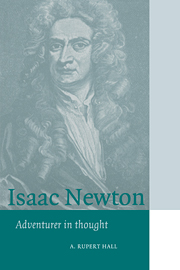Book contents
- Frontmatter
- Contents
- List of Figures
- General Editor's Preface
- Foreword
- Acknowledgement
- 1 The Hopeful Youth, 1642–1664
- 2 “The prime of my age for invention”, 1664–1667
- 3 Widening Horizons, 1667–1669
- 4 The Professor of Mathematics, 1669–1673
- 5 Publication and Polemic, 1672–1678
- 6 Life in Cambridge, 1675–1685
- 7 The Chemical Philosopher, 1669–1695
- 8 The Mathematical Principles of Natural Philosophy, 1679–1687
- 9 Private and Public life, 1685–1696
- 10 Fluxions and Fury, 1677–1712
- 11 Opticks, or a Treatise of Light, 1687–1704
- 12 Life in London, 1696–1718
- 13 A Man of Authority and Learning, 1692–1727
- 14 Later Books, 1706–1726
- 15 Kensington, 1725–1727
- Appendices
- A Newton's Alchemical Studies and his Idea of the Atomic Structure of Matter
- B Newton's Portraits
- C Newton's London Homes
- D Jonathan Swift and Catherine Barton
- E The Fate of Newton's Papers and his Library
- Notes
- Bibliography
- Index
E - The Fate of Newton's Papers and his Library
Published online by Cambridge University Press: 12 January 2010
- Frontmatter
- Contents
- List of Figures
- General Editor's Preface
- Foreword
- Acknowledgement
- 1 The Hopeful Youth, 1642–1664
- 2 “The prime of my age for invention”, 1664–1667
- 3 Widening Horizons, 1667–1669
- 4 The Professor of Mathematics, 1669–1673
- 5 Publication and Polemic, 1672–1678
- 6 Life in Cambridge, 1675–1685
- 7 The Chemical Philosopher, 1669–1695
- 8 The Mathematical Principles of Natural Philosophy, 1679–1687
- 9 Private and Public life, 1685–1696
- 10 Fluxions and Fury, 1677–1712
- 11 Opticks, or a Treatise of Light, 1687–1704
- 12 Life in London, 1696–1718
- 13 A Man of Authority and Learning, 1692–1727
- 14 Later Books, 1706–1726
- 15 Kensington, 1725–1727
- Appendices
- A Newton's Alchemical Studies and his Idea of the Atomic Structure of Matter
- B Newton's Portraits
- C Newton's London Homes
- D Jonathan Swift and Catherine Barton
- E The Fate of Newton's Papers and his Library
- Notes
- Bibliography
- Index
Summary
As will be evident from this biography, Newton carefully preserved his notebooks and papers, including his correspondence, throughout his life, accumulating a mass of folded bundles whose contents were not in all cases readily identifiable. After his death, as part of the settlement of his intestacy, John and Catherine Conduitt received undivided rights to this great mass. Only two manuscripts (The Chronology of Ancient Kingdoms Amended and The System of the World) were found suitable for immediate sale to booksellers for publication; otherwise little from this mass reached print during the eighteenth century, even in Samuel Horsley's collected edition of Newton's writings (1779–85). While Horsley had been able to make only a cursory examination of the papers and remained unperceptive of their significance, Newton's first real biographer, Sir David Brewster, amended and amplified a book already in proof from biographical (and some other) materials selected for him by Henry Arthur Fellowes in 1837.
Fellowes was a nephew of the then Earl of Portsmouth, owner by inheritance of the Newton papers, which were preserved at his seat, Hurstbourne Park in Hampshire. His family name was Wallop; the younger Catherine Conduitt (Newton's ‘Kitty’) had married John Wallop in 1740, becoming titular Viscountess Lymington by the creation of the earldom of Portsmouth for her father-in-law in 1743.
Meanwhile, before Brewster's time many letters and documents sent by Newton to others (including Collins, Boyle and Locke) had reached print, as had extracts or paraphrases of the memoirs of Newton compiled by John Conduitt before and after Newton's death. Some of these Newtonian scraps have since been rejected as false.
- Type
- Chapter
- Information
- Isaac NewtonAdventurer in Thought, pp. 395 - 398Publisher: Cambridge University PressPrint publication year: 1996



